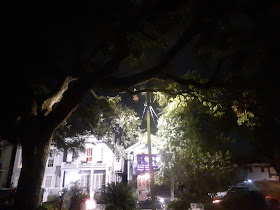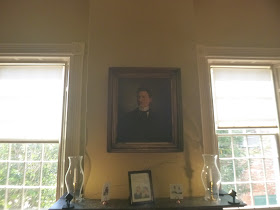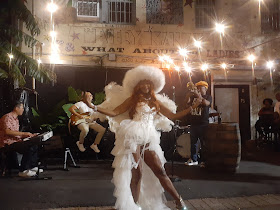Absalom, Absalom, Rice, Beans and a few days in New Orleans
My copy of The Awakening disappeared in my office, enveloped in piles of books. So I picked up Dad’s old first edition copy of Absalom, Absalom from its place in my library to read on the way to New Orleans. The book has always been a bit of a mystery, a secret that only some understand, those in a magic circle seem to smile when talking about, recognizing its power.
Faulkner began the novel with conversation:
“Quentin Compson preparing for Harvard in the South, the deep South dead since 1865 and peopled with garrulous outraged baffled ghosts, listening, having to listen, to one of the ghosts, which had refused to lie still…” (p. 9).
Quentin encounters a storyteller who speculates:
“...maybe you too will enter the literary profession as so many Southern gentlemen and gentlewomen are doing now and maybe someday you will remember this and write about it…” (p.9 -10).
I imagine Dad at Harvard reading his copy, twenty years after it was published in 1936, thinking about Quentin, feeling those ghosts, recalling the stories he was told about the “Great unpleasantness,” as his grandmother described it, the “War of Northern Invasion.” He lived in Cambridge, embracing a modern disposition, as well as a past which gripped the violence his father brought home after his tour in the Great War, a generation after his great, great grandfather, marched back starving to Thomasville from the site of Atlanta burning. Like many sons of the south, he lived with the conflict Faulkner knew too well:
“No man can cause more grief than one clinging blindly to the vices of his ancestors…” says Faulkner. “If we Americans are to survive it will have to be because we choose and elect and defend to be, first of all, Americans; to present to the world one homogeneous and unbroken front, whether of white Americans or black ones or purple or blue or green…”
Back in NOLA for the Faulkner Fest, the September sun filled the Vieux Carré, brass oil lamps along colonial streets, Spanish moss hanging in the trees along the impossibly romantic streets of the Esplanade, a man sleeping in one stoop, another woman sitting smoking a cigarette.
“My, my, a body does get around…” said Faulkner.
It remembers more than we maybe want to, holding traces of furtive backward glances that become connections, we would just as well forget.
“I’m not voting for that fake hillbilly. That’s all I’m going to say about politics,” Rosemary, the head of the Faulkner society, greeted us at the BK House, on Chartres Street, built in 1826, an example of Creole and American architectural styles, where the Faulkner Fest would begin.
“Even history if not as true as it could be,” said Thomas Mallon, to start the talks.
“How can the dead be truly dead when they live in the souls of those who are left,” wondered Carson McCullers, by way of Columbus, Ga and Brooklyn
Lawrence William Coates followed the theme of diversity in the characters of William Faulkner, leading us through a close reading of Light in August, tracing the shaping and unshaping of a queer family at the center of the story. My mind goes back to Dad and his authoritarian family, ever struggling with what he should be, what would become.
"The past is never dead. It's not even past,” William Faulkner. “All of us labor in webs spun long before we were born, webs of heredity and environment, of desire and consequence, of history and eternity."
Thirty years ago, I remember Clinton ascendant, Carter giving talks again, and Ann Richards, my governor of Texas, the South as a forward leaning force. How soon that all changed, Richards losing to Bush, Clinton losing congress, and memory of the legacies of the war, lost to a mallification of the imagination, with the narratives of slavery that Tony Morrison wrote about, borrowing from Faulkner’s ghosts, exhumed, replaced with revisionist narrates recasting slavery as “character building,” and critical race theory as suspect, the lessons of the civil war obfuscated, swept under the rug.
Differentiate between the man and work, says Coates, a genial professor of English and Creative Writing from Bowling Green State University.
You don’t want to be in too much of a hurry, he paraphrased Faulkner, ever debating with Baldwin, who was rightfully less than inured with the go slow approach that seemed to have lasted hundreds of years. Everyone has a dichotomy with their past. Faulkner certainly did, throwing beer cans down from the second-floor balcony of Pirate’s Alley, as I do.
In Mississippi, Faulkner contained all his, all our contradictions, tracing a mythology, a habitus, that seemed to characterize locales and hamlets throughout the world, inspiring Macondo, transforming modern literature.
He came to NOLA and met Sherwood Anderson, said Rosemary.
Give credit to NOLA, says Coates. He got his feet wet as a writer here. He came as a poet and left as a novelist. He was bullied in his hometown, revered here. He got a lot of encouragement. Getting out of Mississippi and meeting the NOLA writers was enormously influential for him.
Race was murkier here, said one of conference attendees, reflecting with pride on her very mixed heritage.
Don’t take whiteness as an uninterrogated category, says Coates, paraphrasing from Russell Banks.
We spent the next three days at the Faulkner Fest, talking about writing and the best ways to cook a roux, thinking about Atlanta and the storms which never quite go away, hanging out with the poets. We ate at Antoine's, the "circa-1840 old-world grand dame of fine French-Creole dining." And strolled through the city, down to the Bywater to the end of the world, stopping at Flora Cafe and then Bacchanal Fine Wine & Spirits, where the band played outside, and enjoyed a lovely meal at Bayona on Dauphine street, where “Chef Susan Spicer cooks creative Louisiana fare in a charming old cottage with a lush courtyard.” The local red fish and sweetbreads super. And found ourselves at Kermit's Tremé Mother-in-Law Lounge, where Kermit Ruffins and the Barbecue Swingers played, Night in Tunisia and St James Infirmary, and his daughter, number three of five told us, sang “Overjoyed” by Stevie Wonder. And Kermit screamed at the party bus outside, "hey, we're trying to play some jazz here..." He paused, "That's my cousin." And told stories about taking the band to Paris and the hosts cursing them for being too demanding. And we made our way back through the crowds and Spanish and French buildings.
Patrick, Bill, Lawrence and I talked about poets and friends, the stories that transform us, the clashes and storms that usher in new worlds.
“The clash is the story,” said Patrick, “the clash of a thousand stories.”
Patrick, a retired newspaper man, has been exploring Shakespeare and Homer, channeling Howl in his own poems. Of late, he’s been reflecting on King Lear:
“This is the excellent foppery of the world, that when we are sick in fortune (often the surfeits of our own behavior) we make guilty of our disasters the sun, the moon, and stars, as if we were villains on necessity; fools by heavenly compulsion; knaves, thieves, and treachers by spherical predominance; drunkards, liars, and adulterers by an enforced obedience of planetary influence; and all that we are evil in, by a divine thrusting on...”
We find ourselves reflecting.
Who was this writer who seemed to gaze into our souls, wondered Patrick. He was everything and nothing, said Jorge Luis Borges:
A few of us read poems:
“Express the primal scream…”
“He said what he said so he was what he was… afraid he would scream.”
“Play with anguish and joy, embrace the pain…”
“I learned how to serve drinks and write poetry…”
The conversation turned to friends and our breakups.
“We are either moving toward each other or away,” said Patrick.
We don’t agree. We move away. Or drift away. It's no longer the time for the friendship.
But others are taking place in the quiet places of our minds.
I feel them looking at the trees, walking through the city.
It's a hauntingly beautiful city, ghosts in our midst, in the trees. We ate at Napoleon House and took the tram out to the garden district, and ran from the heat. And took in a final red beans and rice, sat for some music at Buffa’s before we walked through the quiet streets, along the Esplanade home, looking at the Spanish moss, thinking about vampires and Anne Rice novels, grateful this old dream of a city remains even as storms envelop the South.
Says Anne Rice, in Interview with a Vampire:
“New Orleans, though beautiful and desperately alive, was desperately fragile. There was something forever savage and primitive there. Something that threatened the exotic and sophisticated life both from within and without. Not an inch of those wooden streets nor a brick of the crowded Spanish houses had not been bought from the fierce wilderness that forever surrounded the city, ready to engulf it. Hurricanes, floods, fevers, the plague, and the damp of the Louisiana climate itself worked tirelessly on every hewn plank or stone facade, so that New Orleans seemed at all times like a dream in the imagination of her striving populace, a dream held intact at every second by a tenacious though unconscious collective will.”
"New Orleans is a city with the clap" Fred used to say.
It's hard to disagree. But I still love it. It's still the city where I’m from in the future.













































































No comments:
Post a Comment